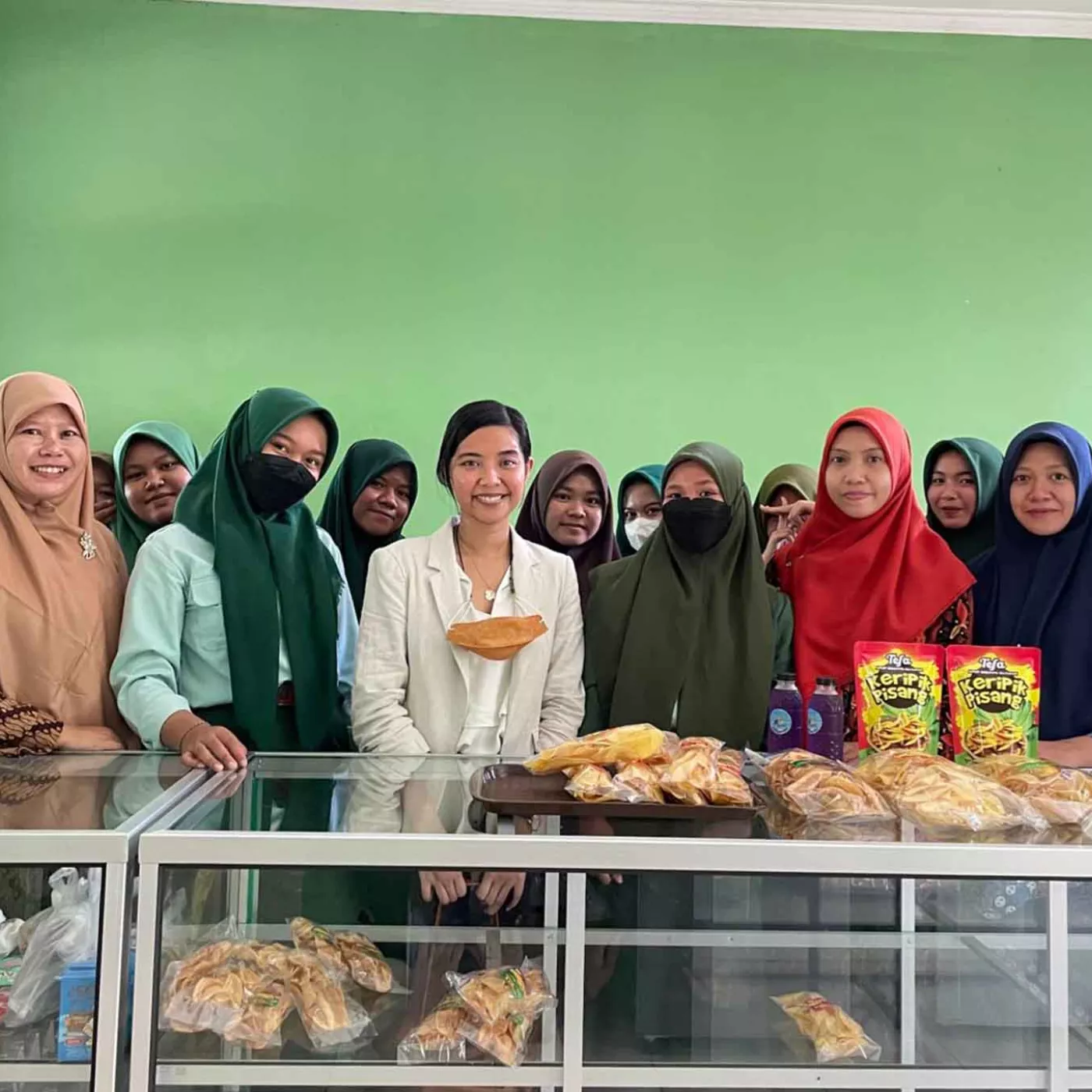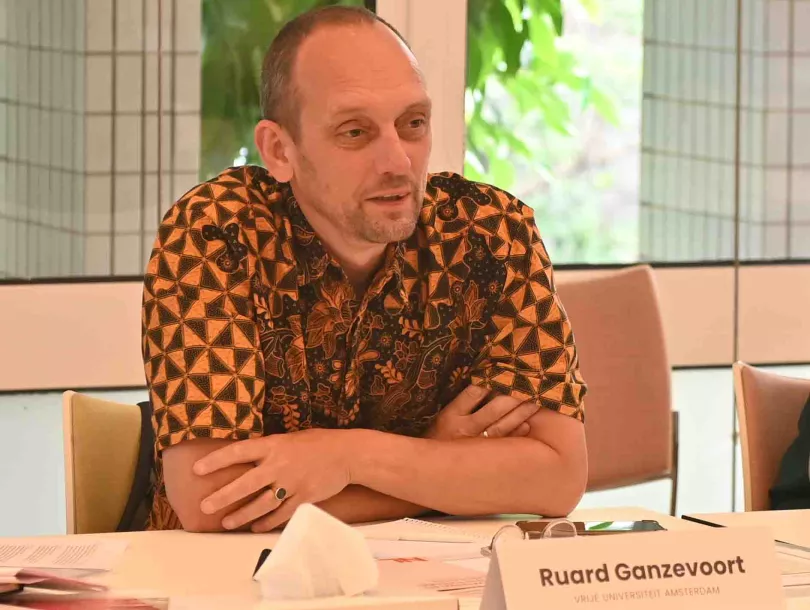Knowledge institutions join forces for cooperation in and with Indonesia

Knowledge institutions are taking part in a pilot by the name of ‘NL Knowledge House’, in which they are partnering in Indonesia for the purpose of international knowledge exchange. NL Knowledge House is an initiative of the knowledge sector itself. Twelve institutions – including research universities, universities of applied sciences and Nuffic – have pledged their cooperation so far. NL Knowledge House also maintains close contact with the attaché for Education and Science at the embassy in Jakarta, as well as with the Dutch Ministry of Education, Culture and Science (OCW) – which is itself a partner in NL Knowledge House. ‘We plan to evaluate the pilot at the end of 2023', says Nuffic Executive director Titia Bredée. ‘Our hope is that even more knowledge institutions will have joined the initiative by then.’
Building blocks
The initial plans for NL Knowledge House were drawn up during a knowledge mission in Indonesia last July. After those exploratory talks, various components – building blocks – were set out for the initiative. First and foremost, NL Knowledge House acts as a matchmaker between Dutch and Indonesian institutions. ‘Active partnership is one of the other building blocks', Bredée adds. ‘The idea that the sum of our shared knowledge is greater than what we know on our own is a core principle underlying the initiative as well. NL Knowledge House will serve as an active partner in discussions regarding grants, policymaking and so on.’
Broadening perspectives
Like Bredée, Ruard Ganzevoort feels that international knowledge exchange is of inestimable value. Ganzevoort is a professor of practical theology at the VU Amsterdam and serves as the coordinator for the network in Indonesia. ‘This kind of international collaboration is crucial for institutions. In cases like this, it's not just about managing enrolment numbers, but genuinely about collaborative research. Ultimately, the quality of education and research improves when you incorporate a global perspective.’ ‘Nearly every challenge we face today is occurring at the global level', Ganzevoort continues. ‘That means they can't be solved locally, or just in your own country. If you look at these issues from a purely Western perspective, you'll overlook a lot of important questions.’ Ganzevoort also recognises the value of the knowledge that students bring home with them after studying abroad. In his opinion, this applies to both Indonesian students who study in the Netherlands and Dutch students who conduct research or study in Indonesia. ‘If we want to foster global citizens with a truly inclusive mindset, partnerships like NL Knowledge House are essential.’

“If we want to foster global citizens with a truly inclusive mindset, partnerships like NL Knowledge House are essential.”
- Quote from Ruard Ganzevoort
Indonesia
Bredée explains that there is a reason Indonesia was chosen for the pilot. And Ganzevoort agrees it was a logical choice. ‘The country of Indonesia has nearly 300 million inhabitants and around 5,000 research universities and universities of applied sciences. That's a huge network. It also has historical ties to the Netherlands’, the professor continues. ‘Indonesia is an incredibly relevant and interesting country. If you're looking for a place where you can both collaborate effectively and make a real difference, Indonesia is it. Our goal is to build a solid and equitable partnership. Indonesia is an equal partner in numerous areas.’
Knowledge as the 11th top sector
According to Bredée, we should be approaching knowledge as a top sector. ‘Because knowledge is, after all, a vital force that drives society. There's a reason we always refer to it as the “eleventh top sector”. But that's not just something you say – the substance matters, too. NL Knowledge House is an example of the kind of substance that can open doors.’
Another important building block is engagement with alumni. ‘Continuing the cooperation with alumni in their new jobs is absolutely vital. After studying in the Netherlands, former students often wind up in important positions. It is not only enjoyable, but valuable for all stakeholders if NL Knowledge House continues to cooperate with alumni. To that end, networking events are organised to promote connections between knowledge institutions, the business community, alumni and other relevant parties’, Bredée says.
Avoid focusing too narrowly on the top 16
Ganzevoort notes that it is important to avoid focusing too narrowly on the 16 most important universities in Indonesia, to the exclusion of all others. ‘Indonesia's top 16 are global players. In many cases, they already have a strong international focus. I think that the other institutions, both Indonesian and Dutch, have much to offer one another. While that might be challenging when it comes to the smaller institutions, those are still places where there are talented individuals who we'd like support in taking their next steps.’
Institutions in the lead and cooperation with the business community
According to Ganzevoort, the fact the institutions themselves are taking the lead in NL Knowledge House means that its activities will reflect the interests of those institutions as effectively as possible. ‘Hopefully, NL Knowledge House will yield a form of collaboration that best fits what the degree programmes and students actually need.
And NL Knowledge House will actively pursue partnerships with the business community as well. As an example, Bredée explains how Janssen Poultry is sponsoring a chicken incubator for an Indonesian secondary vocational school. ‘Aeres University of Applied Sciences was involved in that project as well. Something like that is a great public-private partnership, for which NL Knowledge House can hopefully provide a lot of value.’
Role of the embassy and government
In addition to the role of NL Knowledge House, both Bredée and Ganzevoort emphasise the embassy's role in the cooperation between knowledge institutions in the two countries. ‘Together with the attaché for Education and Science, our institutions can obviously do a great deal when it comes to maintaining contacts and bringing the right parties together’, says Ganzevoort. ‘When it comes to embedding it in the broader policy, the government has a role to play. And the knowledge the Ministries of OCW and Foreign Affairs can offer is essential in that regard as well’, Bredée adds.
More institutions welcome
The pilot will be evaluated in late 2023. ‘My hope is that, by then, even more knowledge institutions will have become affiliated with NL Knowledge House’, Bredée says. ‘I also hope that with NL Knowledge House, we have found an exciting form of international knowledge exchange that we will be able to apply in other countries as well.’
Want to learn more about NL Knowledge House?
If you are interested in participating in this pilot, please contact Nanya Burki, nanya.burki@nesoindonesia.or.id.
More information on knowledge collaboration in Indonesia?
The ‘Week of Indonesian-Netherlands Education and Research’, or WINNER, takes place from 18-20 October. The purpose of WINNER is to celebrate, reinforce and expand the collaborative partnerships between educational institutions in Indonesia and the Netherlands. Visit www.winner.or.id to learn more about WINNER and the activities that are being held this year.